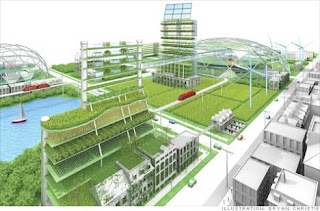Fortune Magazine's illustrator shows abandoned land in Detroit being converted into "cutting edge, city style farms. Solar panels and windmills power vertical growing systems that are efficient, attractive, and tourist-friendly. Greenhouses allow crops to grow year-round. And new development sprouts on the periphery."
John Hantz's farm won't look quite as high tech as the drawing; they are using vacant land (of which Detroit has a great deal) to "transform this area into a viable, beautiful and sustainable area that will serve the community, increase the tax base, create jobs and greatly improve the quality of life in an area that has experienced a severe decline in population."
Hantz Farms plans to grow natural, local, fresh and safe fruits and vegetables to help meet Michigan's increasing demand for locally grown produce. In addition to food and trees, Hantz Farms will harvest wind energy and utilize geothermal heat and biomass fuel from recycling compost...... [the business plan calls] for the deployment of the latest in farm technology, from compost-heated greenhouses to hydroponic (water only, no soil) and aeroponic (air only) growing systems designed to maximize productivity in cramped settings.
Sounds lovely, if a bit more than necessary to start a farm. But what is the real business plan? David Whitford of Fortune Magazine writes about Hantz's "revelation":
"We need scarcity," he thought to himself as he drove past block after unoccupied block. "We can't create opportunities, but we can create scarcity." And that, he says one afternoon in his living room between puffs on an expensive cigar, "is how I got onto this idea of the farm."
In other words, there is too much land lying around doing nothing, making it worth almost nothing. If you are in the real estate business, you like scarcity, it drives up prices. Right now he can buy formerly residential land (less toxic than industrial) for $3,000 per acre, and is looking for lower tax rates and contributions of free tax delinquent land. That is the same per acre as a farm in the country. Smack in the middle of a city. Whitford notes that some of the biggest skeptics are the people already farming in Detroit.
"I'm concerned about the corporate takeover of the urban agriculture movement in Detroit," says Malik Yakini, a charter school principal and founder of the Detroit Black Community Food Security Network, which operates D-Town Farm on Detroit's west side. "At this point the key players with him seem to be all white men in a city that's at least 82% black."
But just about everyone else thinks it is a great idea as he scoops up thousands of acres. Hantz denies it is an "underhanded land grab".- "Viability and sustainability to me are all that matters." But in the next paragraph he says: "This is like buying a penthouse in New York in 1940," Hantz says. "No one should be able to afford to do this ever again."
Perhaps I spent too much time with developers and real estate people in my architectural career, but Hartz has said it all in Fortune, from his first comment about sopping up excess land and creating scarcity to his last quote about buying a penthouse in New York. This sure sounds like a classic real estate play to me. But if it takes unused land in a temperate part of the country with lots of water and people who need jobs, and grows local and healthy food, go for it. That's the American way and it works.
http://www.treehugger.com/




No comments:
Post a Comment